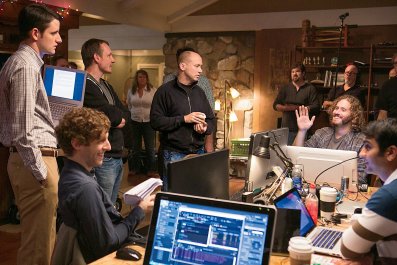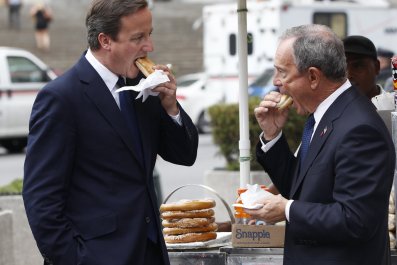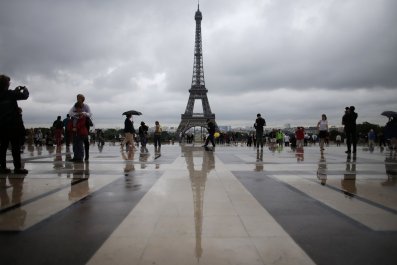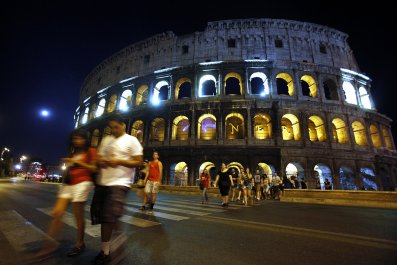On a Tuesday evening in late April, in a London paralysed by a tube strike, more than 900 people battled to the National Theatre on the South Bank pursuing what might appear to be a questionable promise. If matters proceeded as advertised that night, ticket holders would be reduced to tears.
Even more remarkable, perhaps, was the nature of the entertainment. Poetry – the burden that weighs heavily on the eyelids of every school pupil and dispatches booksellers to the smallest shelf in the darkest cranny of their shops – was due to take centre stage at the Lyttelton Theatre. It was neither a wedding, a funeral, nor an A-Level exam, yet W.H. Auden, Philip Larkin and William Shakespeare were on the menu. The evening cost £4 per ticket and did not include the price of a tissue.
This was the public launch ofPoems That Make Grown Men Cry, edited by the journalist and biographer Anthony Holden, and his film producer son, Ben. The anthology, whose proceeds will go to Amnesty International, had brought poetry to the bestsellers list and on to the front pages of the Sunday newspaper supplements.
The provocative title, plus an all-star cast of figures from cinema, television, literature, comedy and music, who had each chosen a poem for the collection, contributed to what amounted to a small sensation in publishing terms. But for poetry's many, many acolytes – the Holdens included – it was simply the most visible recent endorsement for a vital art form. Far from being an archaic and redundant practice, poetry may in fact provide the essential intellectual nourishment to survive our time-pressed, emotionally-bereft 21st century lives.
"You can read a poem in 30 seconds…but that 30 seconds will get stretched," Ben Holden says. "That purity, that concentrated emotional response it can elicit in you, that longevity and the density of that, it's so valuable."
"It's like going to the emotional gym," his father says.
Poetry, it may appear, is back. Yet in many ways, it has never been away. According to a recent article in the Bookseller magazine, poetry has shifted units worth close to £100 million over the past 14 years, and the industry's two most recognisable accolades, the Forward Prize and T.S. Eliot Prize, have been awarded annually since 1992 and 1993, respectively. They now offer a combined £40,000 to their various winners and shortlisted poets.
A recent survey commissioned by the chain of British supermarkets, Waitrose, discovered that 83 percent of people said they either loved or had an interest in poetry, while 1.9 million Britons profess similar poetic sympathies on Facebook. Everything from Chester Zoo to the Great North Run has its own poet in residence, and commercial brands from Dove soap to Transport for London have employed poets to offer some kind of authenticity to their interactions with the public.
Actors Rob Brydon and Steve Coogan quote liberally from the romantics during The Trip To Italy at prime-time on Friday night on BBC2. On radio, The Verb and Poetry Please are only two of the most popular spoken word programmes broadcast weekly. Furthermore, in the back-rooms of pubs across the country, poetry has supplanted stand-up comedy both as a form of personal expression and rabble-rousing entertainment. Videos of the young poetry stars Hollie McNish and Mark Grist reading their poems have been viewed more than three million times on YouTube.
Verse unites the Oxbridge-educated classical scholar with the urban youth steeped in the lyrics of the street, and despite the mention of only one gender in the title of the Holdens' anthology, presently the five poet laureates from the British Isles are women: Carol Ann Duffy, Liz Lochhead, Gillian Clarke, Sinéad Morrissey and Paula Meehan. Poetry is perhaps the most democratic art form in Britain.
For all that, in more than 15 recent conversations I had with poets or industry figures, the subject of the economics of poetry was inescapable. No one suggested the £100 million figure translated into anything like riches and, while poets may not quite be confined to garretts, subsisting only on morsels they can harvest from nature, almost nobody in the UK makes a living only from writing poetry.
Poets are also university lecturers, creative writing tutors or performers, and they are forever seeking grants, gigs or commercial commissions. Poems That Make Grown Men Cry sold 5,600 copies in its first five weeks, which was considered remarkable. But, to choose a comparison from the same Sunday Times bestsellers list, Jeffrey Archer's Be Careful What You Wish For had sold 40,670 copies by its ninth week. Most first-time poetry collections will be lucky to sell a few hundred copies, plus whatever are bought at the end of readings across the country.
In 2013-14, Arts Council England committed a little less than £3.1 million from its national portfolio to poetry, and is by a long way the biggest sponsor of the form. But after a round of cuts in 2011 it withdrew funding for the Poetry Book Society, organisers of the Eliot Prize, among other literary organisations. Even the most literate howls of protest the country has ever seen, led by Carol Ann Duffy, have not yet succeeded in bringing back the bucks.
The media too seem confused by poetry's standing. Every couple of years or so, in what has become a vexing cycle for those involved, poetry is declared either "dead" or "the new rock and roll," despite almost no meaningful difference in book sales.
"In some ways it's that question of whether poetry is dying that keeps poetry alive," Chris McCabe, a poet and librarian at the Saison Poetry Library at Southbank Centre in London, says. "The idea of marketing poetry and selling poetry doesn't change the fundamental human need for excited, elevated language. When people can't find the words, they look for somebody who has found the words. That's what poetry is."
McCabe, who is in his mid 30s, first discovered the library that now employs him when, as a young poet, he made the trip from his native Liverpool to examine the widest collection of verse in the country. The collection McCabe presides over now is significantly larger: on the periodicals shelves there are more than 180 magazines and journals that regularly publish poetry and the library collects between 200-300 books per month.
"You've got these two things side by side: there's more being published and less being sold," McCabe said. "The big publishers are struggling, the independent publishers are struggling, but we at the library are collecting more than we've ever collected before. We can't keep up with what's being published."
Broadly speaking, the poetry industry in the UK operates on three levels. The mainstream publishers such as Faber & Faber, Penguin and Jonathan Cape (an imprint of Random House) maintain a poetry list combining the classics and established favourites, with a handful of bright young talents (Sam Riviere and Emily Berry are both with Faber). Poetry is at times an indulgence; the business model is underwritten by other, more profitable, publishing arms.
At the other end of the spectrum are pamphlet publishers and tiny presses, only some of whom will receive any funding, and whose editors cannot afford to regard their business as anything but a labour of love. They are the talent scouts with an eye on the grassroots game, offering a platform for new voices or a home for the most talented hobbyists. They provide an opportunity for the future stars to hone their skills before possibly being plucked by one of a handful of bigger presses.
Bloodaxe Books and Carcanet Press are the two largest independent poetry publishers in the UK, both of whom receive regular funding from Arts Council England but set their financial ambitions only at breaking even. Both, however, have published some of contemporary poetry's most significant global talents. Chinua Achebe, Robert Graves and Edwin Morgan were with Carcanet before their deaths, and Les Murray still is. Bloodaxe has published the likes of Federico García Lorca alongside dissidents from Romania, Syria, China and Palestine, among others, as well as collections from Simon Armitage (now with Faber) and Benjamin Zephaniah.
Neil Astley, who founded Bloodaxe in 1978 and remains its editor, has spent the past 36 years attempting to broaden poetry's appeal. In 2002, Bloodaxe released an anthology edited by Astley entitled Staying Alive: Real Poems for Unreal Times, which presented more than 500 contemporary poems as a kind of essential elixir for survival in the modern world. It has sold more than 200,000 copies worldwide.
"These are poems relating not only to times of personal anxiety but to unreal times we live through as people," Astley wrote in the introduction. He says: "Poetry is a reaction against manipulation. In our contemporary society, there's so much manipulation going on, with advertising and politics and language being used in all kinds of ways to twist its meaning in order to manipulate your responses. Poetry is something which is somehow separate from that…It's about being human, the essentials of life."
Poetry entered the news in the UK again recently following the release of Black Rainbow, the memoir of the former journalist Rachel Kelly, in which she details how poetry helped her battle acute depression. At the launch of Black Rainbow, London mayor Boris Johnson and UK Secretary of State for education, Michael Gove, who are family friends, read poems dedicated to Kelly, and the image of the Tory politicians stewing over verse drew some titters in the press.
However, Kelly's book tells a real and harrowing tale of her descent from successful, wealthy and healthy mother of two to the brink of suicide, debilitated by what is still considered a distinctly modern illness. She found salvation, though, in the words of poets whom she discovered must have experienced something similar, before battling back to health with the poems that encourage acceptance. Overcoming a feeling of isolation and then acknowledging the terms of ones existence are both key factors in overcoming depression.
"The very best poems give you this bit of hope, something to hold on to," Kelly says. She is now a mother of five and, to the extent it is possible, "recovered". She adds: "When you find a poem, particularly if it's someone writing two or three hundred years ago, which makes you realise that it's part of our common humanity and it's been around for ever, that in some ways in incredibly comforting."
The capacity for poetry to move, and indeed heal, may actually be hard-wired and less the result of education or culture than our biological evolution. According to Michael Trimble, Emeritus Professor in Behavioural Neurology at University College London, poetry is appreciated by humans for its rhythms and movements and is more similarly related to the way we respond to music than to regular speech or visual art.
Trimble says that people suffering aphasia as a result of brain damage, who can lose most speech, still have an ability for emotional expression, can respond to music and can also continue to write poetry. His studies, particularly into the psychology of crying, have led to conclusions that not only did some hunter-gatherer societies first develop cooking techniques and campfire communities, but that their uniquely nourished brains also produced the first music and the first "emotional communications" – tears, in other words.
Some form of singing or poetry likely followed soon after as man responded emotionally to loss, bereavement and dreams. The production and interpretation of primitive poetry was thus fused with the great mysteries of life, all of which were more formally explored hundreds of thousands of years later by the timeless dramatists of fifth-century Athens.
"The other thing that happened in the course of Homo sapiens is that we developed a very, very powerful autobiographical memory system," Professor Trimble says. "The slightest triggers – remember Proust – can evoke autobiographical memories in a very, very powerful way that leads to a total bodily emotional response."
Many introductions to the works in Poems That Make Grown Men Cry refer to autobiographical incidents – typically the loss of a loved one, or a scene evocative of childhood – and the poems they accompany have the power not only to choke, but also to provide the solace of familiarity to their readers. People return time and again, like they do to a favourite tune.
"I read this poem often, once a month at least," the actor Tom Hiddleston writes as he introduces Derek Walcott's Love After Love in Poems That Make Grown Men Cry. (It is also in Kelly's book). "In the madness and mayhem of modern life…this poem reminds me of a basic truth: that we are, as we are, 'enough'…It's like the embrace of an old friend."
Kelly, who is now also working with the charities SANE and United Response, has developed an app to support Black Rainbow, which provides healing words in an instant both for people suffering a depressive episode or "poems for maintenance and everyday guidance, that will get you through."
Poetry has, over the years, developed much more into an art-form to be shared, and Anthony Holden speaks fondly of his conversations about poetry with the likes of Frank Kermode and Christopher Hitchens, which led to the idea for the anthology. He said that his collaboration with his son frequently led to them both crying, Anthony invariably crumbling if Ben did.
But poetry's full-on transition to boisterous performance art has hastened dramatically over the past half century. In the 1960s, the "Liverpool poets" Roger McGough, Brian Patten and Adrian Henri rubbed shoulders with the Beatles and, in 1965, the International Poetry Incarnation at the Royal Albert Hall, which featured William Burroughs and Allen Ginsberg, brought underground poetry blinking into the spotlight.
Subsequently, John Cooper Clarke became the best-known poet to appear on concert bills throughout the punk era, bolstering the lyrical voice of the artistic anarchists and socialists of the 1970s and 1980s. The contemporary spoken word scene is now stronger in the UK than at any other time, with most cities hosting readings or poetry slams every night of the week.
Martin Galton and Dan Cockrill established their poetry night Bang Said The Gun 12 years ago in Brighton, both to indulge their own passion for the form and to encourage others to explore its boundary-less freedoms on the page and in performance. The night, which began as a monthly event, transferred to London, to the Roebuck pub in the south and has been packed to the rafters ever since, especially after becoming a weekly fixture in February 2010.
It is now regularly described as London's premiere spoken word event and has drawn some of the craft's biggest names: John Hegley, Ian McMillan, Kate Tempest, Hollie McNish and Murray Lachlan Young have all performed. Even Andrew Motion has read from the tiny stage in the pub's upstairs function room and described Bang Said The Gun as a "vortex of energy and enthusiasm."
It is, at least on the surface, an anarchic beano, and is much imitated across the country. Cardboard panels splattered in graffiti art cover the windows and walls, visitors receive glow-stick bracelets to illuminate the darkness and the audience is encouraged to shake makeshift maracas fashioned from empty plastic milk bottles filled with beans. There is a remarkable respect shown to the poets, however, and the din abates to a reverent silence as the readings begin – unless, as is frequently the case, the subject matter encourages otherwise.
On the night I attended in early May, poems referenced kissing at bus stops, hangovers, flat-hunting and the Great British Bake Off, but also hit some extraordinary emotional peaks. Rob Auton, who is gaunt and deliberate, but who also unexpectedly won the award for funniest one-liner at the Edinburgh Fringe Festival last year, carefully steered a surreal, rambling verse anecdote about aliens and mice on to the Normandy beaches, peering hauntingly into the faces of the teenage soldiers. Shortly after, Deanna Rodger, who became the youngest UK Poetry Slam champion in 2007, when she was 18, introduced How To Be A Feminist as "a poem that I really think can change the shape of the world." From an iPad mini, she then read a brilliantly-crafted, funny, impassioned feminist polemic, greeted first by captivated silence and then raucous applause.
I had contacted one of the other feature acts, Salena Godden, via Twitter on the day before the show, when she suggested I provide a title for a poem she would write that day and read the following night. She was in the middle of an experiment in crowdsourcing poetic inspiration she called the "Banging Typewriter Challenge" after an old typewriter she had been given on which she would hammer out new verse, typos be damned. I gave her the title "To Make a Grown Man Cry" and the next night heard a sea shanty in which Godden suggested the best way to elicit tears was to "laugh about his willy / with his mother nearby."
Godden first received "payment" for her writing at school when she would exchange poems for cigarettes on Valentine's Day, but now, aged 40, subsists through her writing, performing, broadcasting and journalism. She is by turns contemplative and lewd, committed to the written word but also a natural performer.
"You can't be that mysterious poet any more, you have to roll your sleeves up, do gigs, get on Twitter, promote your books," Godden said. "How else are people going to know what you're doing? Are you going to sit at a bus-stop and whisper it in people's ears?"
The most effective way to distribute poetry has actually now become the focus of keen strategising in the industry, with organisations continually seeking fresh ways to keep poetry in the public eye. As I was reporting this article, I was continually pointed to lines of poetry etched on public spaces or read at landmark events and was handed numerous bookmarks, postcards and flyers featuring poetry. The "London Lines" campaign even printed verse on the wrapping paper for fruit.
The Forward Arts Foundation, established by William Sieghart in 1994, continues to find great success with its annual National Poetry Day, and also insists on a non-industry figure to head its judging panel for the Forward Prize in a bid to stay in touch with the public's taste. Journalist Jeremy Paxman will keep order this year; writer Jeanette Winterson held the baton in 2013.
However, although poetry is often brief, and its potential audience seems keen to consume it in short, sharp hits, moves into the digital realm have been relatively slow. Even in the comparatively rare cases where poetry collections are offered as ebooks, only about 3 percent to 5 percent of sales are via downloads. Readers relish poetry in hard copy, and expensively produced books are most popular, allowing return visits to favourite poems and a reassuring permanent presence on book shelves. (Disposable genre fiction tends to sell best in digital form.)
Nevertheless, the new offerings of the Poetry Book Society, which has operated as a book club since T.S. Eliot and friends founded it in 1953, will be more digitally focused and involve videos of poets reading their work, plus mini-documentaries about the creative process. The Poetry Archive, the "world's premier online collection of poets reading their work" was also recently revamped.
Chris McCabe says the Saison Poetry Library will have an ebook offering before the end of the year, and the organisation remains committed to educating readers of all ages. Even as our conversation veered into a discussion of a current trend for conceptual poetry (think Marcel Duchamp's urinal in verse form) the brightly-coloured books, puppets and play-mats of that morning's "Rug Rhymes" meeting were scattered on the library floor.
"We also put some poems out for the parents," McCabe said. "I know from becoming a parent that one of the most difficult things is trying to switch off your mind and move it from Hickory Dickory Dock. We try to say, while you're here, here's a Ginsberg, something for you to take away."

























